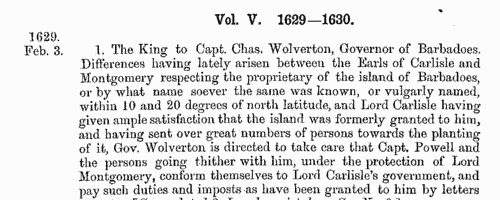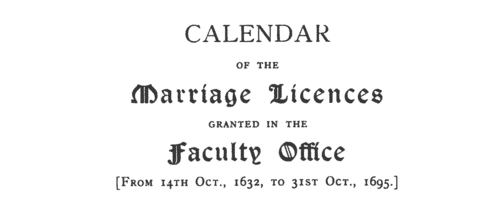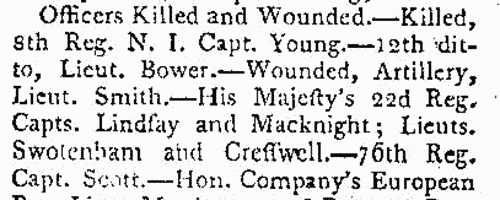Haythorne Surname Ancestry ResultsOur indexes 1000-1999 include entries for the spelling 'haythorne'. In the period you have requested, we have the following 43 records (displaying 1 to 10): Single Surname Subscription | | | Buying all 43 results of this search individually would cost £218.00. But you can have free access to all 43 records for a year, to view, to save and print, for £100. Save £118.00. More... |
These sample scans are from the original record. You will get scans of the full pages or articles where the surname you searched for has been found. Your web browser may prevent the sample windows from opening; in this case please change your browser settings to allow pop-up windows from this site. Colonists and adventurers
(1610-1660)
During this period, the English crown issued charters to companies of adventurers and individual proprietors to establish settlements in Acadia (Nova Scotia), Africa, Amazon, Anguilla, Antigua, Association (Tortuga), Bahamas, Barbadoes, Barbuda, Bermudas (Somers Islands), Canada, Cape Gratia de Dios, Carolina, Bay of Darien, Delaware Bay, Deseada, Dominica, Eleuthera, Enegada, Fernando de Noronho, Floria, Fonseca, Grenada, Guadaloupe, Guiana, Guinea, Henrietta, Jamaica, Long Island, Maine, Marigalante, Maryland, Metalina, Montserrat, Narrangansetts Bay, Nevis, New England (New Plymouth, Massachusetts, Connecticut and New Haven), Newfoundland, New Hampshire, New York, Nova Scotia, Providence Island, Quebec, Redendo, Rhode Island, St Bartholomew, St Brandon, St Christopher's, St Eustache, St Lucia, St Martin, St Vincent, Sembrera, Surinam, Tadousac, Tobago, Todosantes, Trinidad and Virginia. The central archive relating to these ventures up to 1688 amounted to 71 volumes of correspondence, plus 109 entry books containing entries of letters sent to the colonies, of charters, commissions and instructions, minutes and proceedings of the companies and proprietaries that in the first instance governed several of the colonies, journals of the Board of Trade, &c. This archive, called the State Papers, Colonial Series, at the Public Record Office, was calendared for the period through to 1660 by W. Noel Sainsbury, and published in 1860. The first few pages include material as early as 1574, but the bulk of the volume is from 1610 to 1660, and that is indexed here.HAYTHORNE. Cost: £4.00.  | Sample scan, click to enlarge

|  Apprentices registered at Bristol in Gloucestershire
(1712-1713) Apprentices registered at Bristol in Gloucestershire
(1712-1713)
Apprenticeship indentures and clerks' articles were subject to a 6d or 12d per pound stamp duty: the registers of the payments usually give the master's trade, address, and occupation, and the apprentice's father's name and address, as well as details of the date and length of the apprenticeship. There are central registers for collections of the stamp duty in London, as well as returns from collectors in the provinces. These collectors generally received duty just from their own county, but sometimes from further afield. January 1712 to June 1713. For some reason, the Bristol collector was the only one in the country to make his return in Latin. (The sample entry shown on this scan is taken from a Norfolk return)HAYTHORNE. Cost: £8.00.  | Sample scan, click to enlarge

| Licences for marriages in southern England
(1632-1714)
The province or archbishopric of Canterbury covered all England and Wales except for the northern counties in the four dioceses of the archbishopric of York (York, Durham, Chester and Carlisle). Marriage licences were generally issued by the local dioceses, but above them was the jurisdiction of the archbishop. Where the prospective bride and groom were from different dioceses it would be expected that they obtain a licence from the archbishop; in practice, the archbishop residing at Lambeth, and the actual offices of the province being in London, which was itself split into myriad ecclesiastical jurisdictions, and spilled into adjoining dioceses, this facility was particularly resorted to by couples from London and the home counties, although there are quite a few entries referring to parties from further afield. Three calendars of licences issued by the Faculty Office of the archbishop were edited by George A Cokayne (Clarenceux King of Arms) and Edward Alexander Fry and printed as part of the Index Library by the British Record Society Ltd in 1905. The first calendar is from 14 October 1632 to 31 October 1695 (pp. 1 to 132); the second calendar (awkwardly called Calendar No. 1) runs from November 1695 to December 1706 (132-225); the third (Calendar No. 2) from January 1707 to December 1721, but was transcribed only to the death of queen Anne, 1 August 1714. The calendars give only the dates and the full names of both parties. Where the corresponding marriage allegations had been printed in abstract by colonel Joseph Lemuel Chester in volume xxiv of the Harleian Society (1886), an asterisk is put by the entry in this publication. The licences indicated an intention to marry, but not all licences resulted in a wedding. HAYTHORNE. Cost: £4.00.  | Sample scan, click to enlarge

|  Masters of Apprentices registered at Gloucester
(1741-1745) Masters of Apprentices registered at Gloucester
(1741-1745)
Apprenticeship indentures and clerks' articles were subject to a 6d or 12d per pound stamp duty: the registers of the payments usually give the master's trade, address, and occupation, and the apprentice's father's name and address, as well as details of the date and length of the apprenticeship. There are central registers for collections of the stamp duty in London, as well as returns from collectors in the provinces. These collectors generally received duty just from their own county, but sometimes from further afield. (The sample entry shown on this scan is taken from a Norfolk return)HAYTHORNE. Cost: £8.00.  | Sample scan, click to enlarge

|  Masters of apprentices registered in Bristol
(1769) Masters of apprentices registered in Bristol
(1769)
Apprenticeship indentures and clerks' articles were subject to a 6d or 12d per pound stamp duty: the registers of the payments usually give the master's trade, address, and occupation, and the apprentice's name, as well as details of the date and length of the apprenticeship. There are central registers for collections of the stamp duty in London, as well as returns from collectors in the provinces. These collectors generally received duty just from their own county, but sometimes from further afield. The indentures themselves can date from a year or two earlier than this return. (The sample entry shown on this scan is taken from a Salop return. Each entry has two scans, the other being the facing page with the details of the indenture, length of service, and payment of duty.) IR 1/56HAYTHORNE. Cost: £8.00.  | Sample scan, click to enlarge

| Inhabitants of Bristol
(1775)
On 7 October 1775 a loyal address of the 'Mayor, Burgesses, Clergy, Freeholders, and Inhabitants of the City of Bristol', 880 in all, was presented to king George III viewing 'with Astonishment the Conduct of a few disappointed Men, whose sophistical Arguments, and seditious Correspondences, have, in a great Measure, been the Occasion of deluding your American Subjects into open Rebellion', lamenting 'the Misfortune our American Brethren have brought upon themselves', and hoping 'that the Loyalty which prevails here, will soon convince our Fellow-Subjects in America of their Error, and bring them back to a just Sense of their Duty and Allegiance'. The address was presented to the king at St James's by fourteen gentlemen on the citizens' behalf, 'Which Address His Majesty was pleased to receive very graciously: And they all had the Honour to kiss His Majesty's Hand.'HAYTHORNE. Cost: £6.00.  | Sample scan, click to enlarge

| Gloucestershire Freeholders and Tenants: Marshfield
(1776)
The election of a knight of the shire to represent the county of Gloucester in Parliament began 6 May and continued until 17 May 1776, the Hon. George Cranfield Berkeley and William Bromley Chester, esq., being the candidates. The franchise was for adult males possessing freehold worth 40s or more per annum. This poll book lists all voters, arranged by hundred and then by township according to the place where their freehold lay. The voter's full name is given (surname first); place of abode; of what the freehold consists (such as messuage and lands); in whose tenure; and how his vote was cast.HAYTHORNE. Cost: £6.00.  | Sample scan, click to enlarge

| Inhabitants of Bristol
(1790-1797)
The provincial sections of the Universal British Directory include lists of gentry and traders from each town and the surrounding countryside, with names of local surgeons, lawyers, postmasters, carriers, &c. (the sample scan here is from the section for Bath). The directory started publication in 1791, but was not completed for some years, and the provincial lists, sent in by local agents, can date back as early as 1790 and as late as 1797.
HAYTHORNE. Cost: £6.00.  | Sample scan, click to enlarge

| Freemen of Canterbury by Marriage
(1392-1800)
No man or woman could trade in the city of Canterbury without having obtained 'freedom' of the city, unless they paid an annual fee to do so. Admissions of freemen were recorded on the Chamberlains' Accounts of the city, which were prepared annually from Lady Day (25 March) to Lady Day until 1752, and thereafter each set runs from 1 January to 31 December. The accounts for 1392 are incomplete, but thereafter until 1800 there is a complete series except for the years 1455 to 1457 and the year 1552-3. Joseph Meadows Cowper, Honorary Librarian to the Corporation, produced this extract of the names from 1392 to 1800, and the volume was privately printed in 1903. There are five groups of freemen: those who obtained freedom after serving out an apprenticeship to a freeman; the children of freemen; those who married a freeman's daughter; those who claimed freedom by 'redemption', i. e. by purchase; and those who were honoured by a gift of the freedom from the Mayor and Court of Aldermen. Cowper published his lists divided into the five categories: the sample scan is from the list of those who obtained freedom by marriage. This is the index to those who gained their freedom by marriage.HAYTHORNE. Cost: £4.00.  | Sample scan, click to enlarge

| Deaths, Marriages, News and Promotions
(1805)
Death notices and obituaries, marriage and birth notices, civil and military promotions, clerical preferments and domestic occurrences, as reported in the Gentleman's Magazine. Mostly from England and Wales, but items from Ireland, Scotland and abroad.
HAYTHORNE. Cost: £4.00.  | Sample scan, click to enlarge

|
Research your ancestry, family history, genealogy and one-name study by direct access to original records and archives indexed by surname.
|













